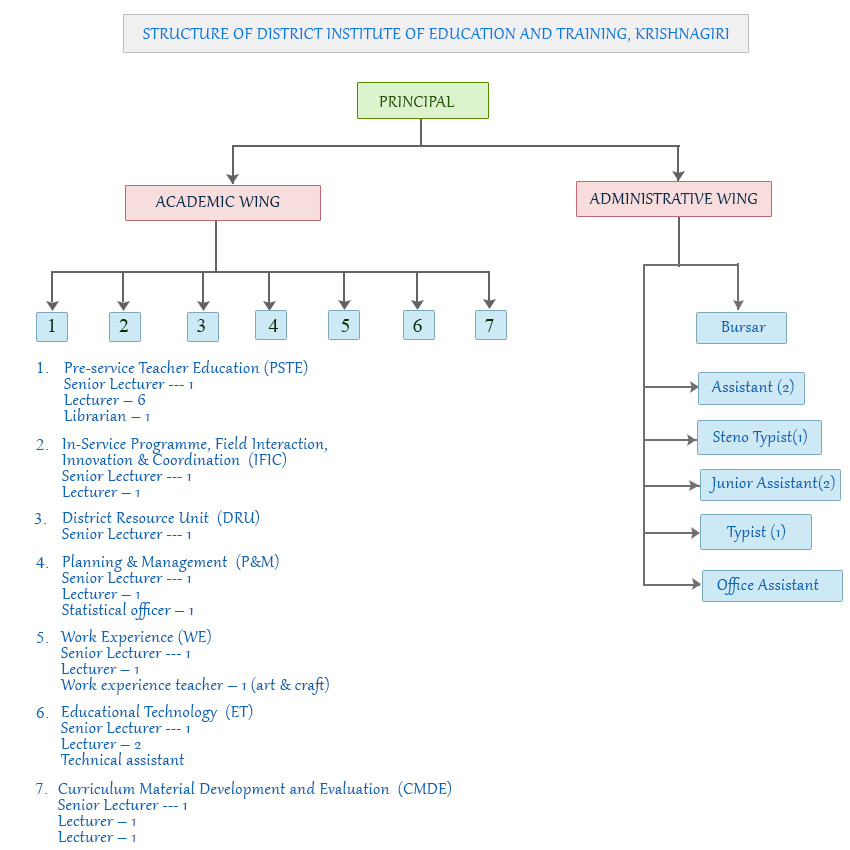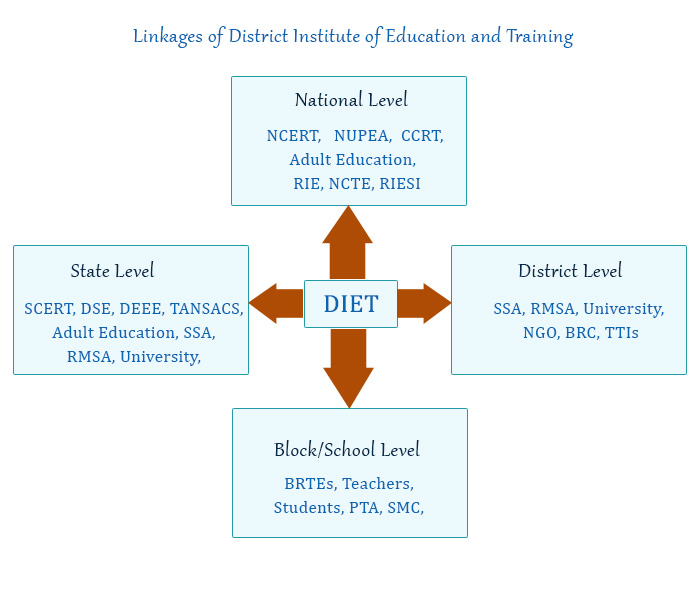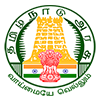About Us
Vision
To provide academic and resource support to the Elementary, Adult and Non-Formal Educational sectors for the continuous quality improvement.
Mission
- To prepare quality, competent and character teachers for the Elementary Education,
- To organize need based trainings to the HMs, BRTEs and Teachers
- To prepare relevant local teaching learning materials and Educational Technology inouts to the Elementary Education
- To develop curriculum materials and evaluation items for the learners achievement
- To undertake action researches, research projects, schools visits and publication of newsletter
History of DIET
of all the factors that influence the quality of education the quality, competence and character of teachers are undoubtedly the most significant. Education Commission (1964-66).
Elementary and adult education systems were already too vast to be adequately supported by national and State level agencies alone like NCERT, NIEPA and SCERTs earlier. Likewise in the area of adult education, this support was being provided by the Central Directorate of Adult Education at the national level, and by State Resource Centres (SRCs) at the State level. Below the State level, there were elementary teacher education institutions but their activities were confined mostly to pre-service teacher education.
Pursuant to the provisions of National Policy on Education (NPE 1986) on teacher education, a Centrally sponsored Scheme of Restructuring and Reorganization of Teacher Education was approved in October 1987. One of the five components of the Scheme was establishment of DIETs. Draft guidelines for implementing the DIET component were circulated to States in October 1987 and have, together with certain subsequent circulars, formed the basis for its implementation so far. Till October 1989, Central assistance had been sanctioned under the Scheme for setting up a total of 216 DIETs in the country.
In Tamil Nadu, there are totally 32 DIETs at present established in 4 phases among which DIET Krishnagiri is established in second phase in the year 1996. Situated in the outskirts of Krishnagiri town, on Chennai highways near significant landmark of Government arts college and Polytechnic, our DIET is functioning with seven departments . Their functions are listed as found here.
DIETs: Transactional Philosophy
A DIET will have 3 main functions, viz.
- Training (both of induction level as well as continuing varieties),
- Resource support (extension/guidance, development of materials, aids, evaluation tools, etc.) and
- Action research
Basic Transactional Approach for the DIETs: Placing the Learner at the Centre.
DIETs: Special Target Groups
The concept a National System of Education implies that, up to a given level, all students, irrespective of caste, creed, location or sex, have access to education of a comparable quality: says the NPE. It goes on to say �to promote equality, it will be necessary to provide for equal opportunity to all not only in access, but also in the condition for success�. It follows that DIETs also, in all aspect of their work, would have to give primary attention to promotion of education of the below groups.
- Girls and women,
- Scheduled castes and Scheduled tribes
- Minorities
- The handicapped, and
- Other educationally disadvantaged groups e.g. working children, slum-dwellers, inhabitants of hilly, desert and other inaccessible areas, etc.
Structure of DIET
Structure Of District Institute Of Education & Training

Linkage of DIET
Linkage Of District Institute of Education & Traning

Department and Function
- Pre-service Teacher Education
- Work Experience
- District Resource Unit
- In-service programme
- CMD & Evaluation
- Education Technology
- Planning & Management
Pre-service Teacher Education
- To organize quality Pre-Service Training for the Elementary School Teachers.
- To propagate Learner Centered Education through preparation of TLM and SLM.
- To provide Child centered Subject related methodology to the teacher trainees.
- To provide psychological guidance and counseling services to schools.
- To prepare learning aids to special children.
- To conduct In-service training to teachers.
- To maintain Science Lab, psychology Lab, Work Experience Materials, Art Education Articles, Physical Education Equipment and maintaining a garden.
- To conduct Action Research on enrolment, retention, participation, regularity and learner�s achievement in Lab Area Schools.
- To promote and support Yoga, Physical Education, Health Education by conducting competitions like debate, elocution, seminar, quiz, essay writing, dance, music, songs etc.,
Work Experience
- To identify locally relevant WE areas and develop sample curricular units, TLM, Low cost teaching aids and evaluation tools/techniques.
- To help educational authorities and schools in planned introduction of WE activities.
- To conduct appropriate in service programs for teachers in the areas of WE
- To provide WE related inputs into all other programs and activities of the institute.
- To organize activities for cleanliness, upkeep and development of the campus and for basic maintenance of furniture and other properties.
- To organize and promote community service activities and study visits to work centers.
- To maintain Workshop /Garden for WE activities.
- To promote work-related hobbies among teacher trainees.
District Resource Unit
- To assist educational authorities in planning and coordinating training programs for AE/NFE personnel.
- To serve as the nodal branch for organizing programs of induction training and continuing education for instructors and supervisors of NFE/AE.
- To conduct orientation program for RPs from NYK, NFE/AE, NGO etc.
- To provide instructional inputs into core areas and individual subjects.
- To evaluate and monitor the quality and efficacy of the training programs for NFE/AE personnel.
- To maintain a data base on all NFE/AE personnel.
- To undertake and develop curriculum, basic and post-literacy TLM, low cost teaching aids and evaluation tools for AE/NFE.
- To undertake field interaction and act as the referral unit for academic problems in AE/NFE.
- To help the DBE and AE/NFE authorities in organizing media support for AE/NFE programs.
- To undertake action research in all areas.
In-Service Programme, Field Interaction, Innovation & Coordination
- To assist educational authorities in planning and coordinating in-service education programs throughout the district.
- To identify training needs of elementary teachers in the district.
- To prepare an annual calendar of all programs to be held in and outside the DIET.
- To serve as the nodal branch for organizing service education programs for teachers and HMs.
- To conduct orientation programs for RPs who conduct in-service programs.
- To conduct in-service programs for teachers in the Distance/Distance cum contact modes.
- To evaluate and monitor the quality and efficacy of in-service programs and strive for their continuous improvement.
- To serve as a reference and resource centres for teachers who wish to continue their education.
- To act as the nodal branch for all action research and field interactions activities.
- To co-ordinate in-house action research activities and disseminate its results.
- To act as a clearing house for information on results of all studies, research, innovation etc.
- To publish periodic newsletter.
Curriculum material development and evaluation
- To adapt existing curricular units and develop new locally relevant units for the district in various subjects.
- To develop teaching – learning materials for general and locally developed curricular units.
- To adopt innovative techniques and guidelines for continuous and summative learner evaluation.
- To develop evaluation tools and techniques for diagnostic testing, remedial programs and talent identification procedures.
- To help the DRU in development work for AE/NFE.
- To undertake testing on sample basis to assess achievement levels among primary & upper primary learners and adult learners under NLM.
- To help educational authorities and schools in implementing a reliable and valid system of learner evaluation.
- To conduct workshops for the adaptation development work relating to CMDE.
- To provide CMDE related inputs into all other programs/activities of pre-service and in-service.
Educational Technology
- To develop simple, effective and low-cost teaching aids for elementary education.
- To help the DRU in developing low-cost teaching aids for AE/NFE
- To maintain all AV equipment of the institute and computer lab.
- To maintain a display area for good & low-cost teaching aids.
- To maintain a library of educational VCDs.
- To lend and borrow slides, cassettes and films to other institutions.
- To liaise with nearby radio station for arranging educational broadcasts.
- To conduct in-service programs for teachers in the area of ET.
- To conduct workshops for the development work
- To provide ET related inputs into all programs/activities of pre-service and in-service branch.
Planning & Management
- To maintain an appropriate data-base for the district.
- To conduct studies with a view to give policy advice to educational planners/administrators/DBE regarding UEE/NLM.
- To study the effects of various interventions of the state.
- To conduct studies in relation to enrolment, retention and regularity of attendance of children and adult learners.
- To develop norms, criteria and techniques for evaluation of institutions.
- To provide technical assistance to educational authorities in school mapping , micro-planning in UPE/UEE, formation and activation of school complexes, institutional planning and evaluation.
- To serve as the nodal branch in relation to all programs of community involvement and conduct orientation programs members of DBE,VEC, youth and other voluntary educational workers.
- To conduct appropriate programs for HMs, block level educational functionaries in P&M.
- To appraise the efficacy of various programs of educational development implemented in the district.
- To act as the nodal branch for preparing quin-quennial and annual institutional plans and annual self-evaluation reports.


 History of DIET
History of DIET Structure of DIET
Structure of DIET Linkage of DIET
Linkage of DIET Department and Function
Department and Function